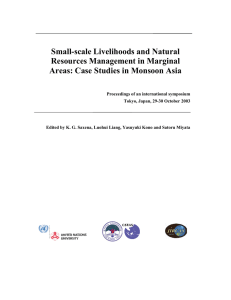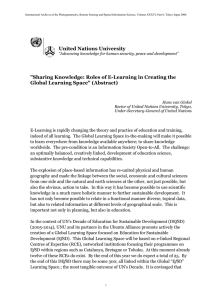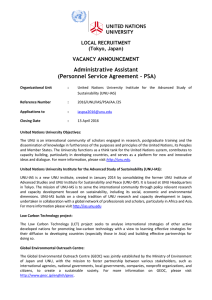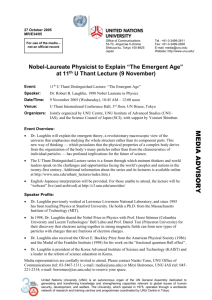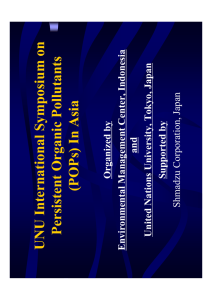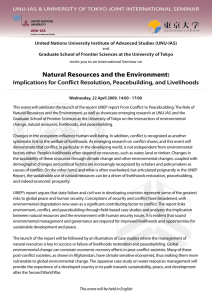Jane_IC_BRIEF-16th-2 - Wangari Maathai Institute for Peace
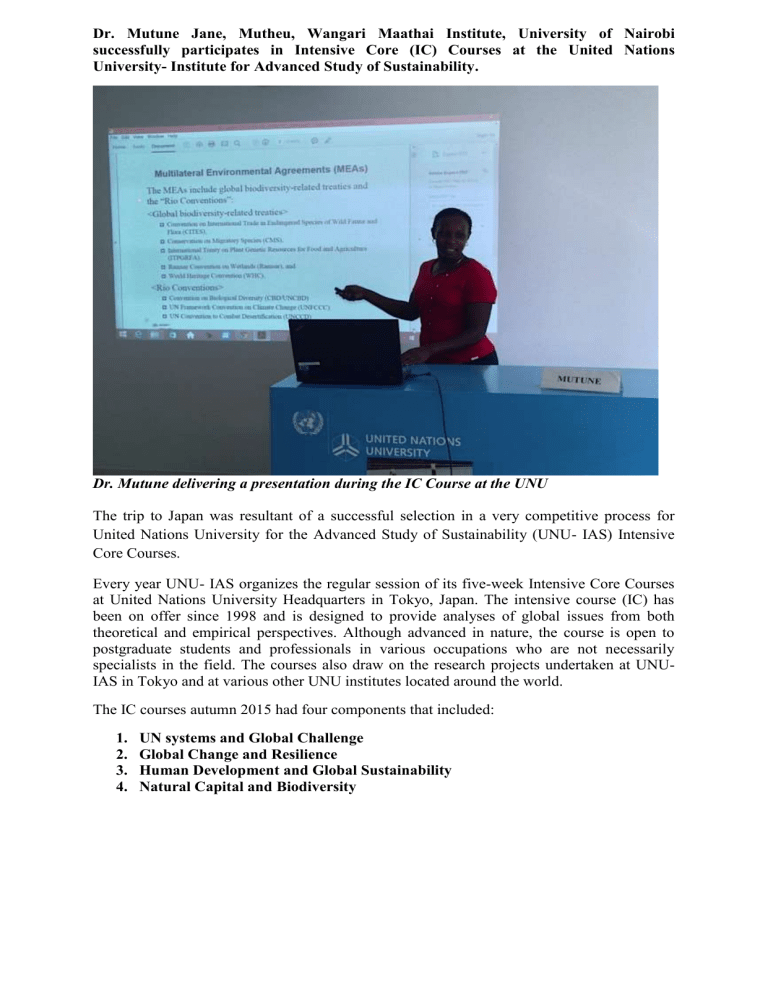
Dr. Mutune Jane, Mutheu, Wangari Maathai Institute, University of Nairobi successfully participates in Intensive Core (IC) Courses at the United Nations
University- Institute for Advanced Study of Sustainability.
Dr. Mutune delivering a presentation during the IC Course at the UNU
The trip to Japan was resultant of a successful selection in a very competitive process for
United Nations University for the Advanced Study of Sustainability (UNU- IAS) Intensive
Core Courses.
Every year UNU- IAS organizes the regular session of its five-week Intensive Core Courses at United Nations University Headquarters in Tokyo, Japan. The intensive course (IC) has been on offer since 1998 and is designed to provide analyses of global issues from both theoretical and empirical perspectives. Although advanced in nature, the course is open to postgraduate students and professionals in various occupations who are not necessarily specialists in the field. The courses also draw on the research projects undertaken at UNU-
IAS in Tokyo and at various other UNU institutes located around the world.
The IC courses autumn 2015 had four components that included:
1.
UN systems and Global Challenge
2.
Global Change and Resilience
3.
Human Development and Global Sustainability
4.
Natural Capital and Biodiversity
Jane and colleagues during an exercusion at Kamakura
The IC Courses were taught in a cooperative fashion by a team of scholars and practitioners comprising both in-house and outside experts. One of the unique features of the IC was that many of the practitioners come from United Nations organizations. Another important characteristic was the direct access to teaching faculty and the support provided to course participants by the UNU-IAS in-house academic staff who serve as academic counsellors.
Because it shares a building with many United Nation agencies, UNU-IAS offers a unique learning environment.
The aim of the IC courses was to provide postgraduate students with broad understanding of current issues in human development, global sustainability and present scholars with the institutional and policy tasks of the United Nations system. The IC course is unique and designed to provide a holistic view of contemporary issues. Thus ultimately integrate scholars and professions with a broad holistic view point of environmental sustainability. Each participant was allowed a maximum of two courses.
The IC course took an experiential learning approach i.e. theory linked with practice through excursions and a home stay programme. The excursions involved visit to the National
Institute of Polar research conducting scientific research and observations in Polar Regions.
Another exciting excursion was at National Astronomical Observatory of Japan (NAOJ)
Mitica Campus that exposed us to the equatorial telescopes e.g. the 20-CM telescope designed to track the apparent motion of heavy objects across the sky. NAOJ is responsible for constructing the Thirty Meter Telescope that will play an essential role in the 2020s to deepen human perception of the structure and evolution of universe, origin of stars, planets and life on earth. Additionally, the home stay programme allowed us an opportunity to learn the Japanese culture and special sightseeing of unspoiled nature and beautiful spots. I had an opportunity to climb Mount Takao with a height of 599 meters. Mount Takao boasts with lush broadleaf forests, fully blooming cherry blossoms ( saccura ) and ancient religious structures.
Jane and colleagues during the cultural exchange programme in Tokyo
The UNU-IAS (IC) course was exciting and of great value. The course highly enhanced my knowledge and confidence on issues of environmental governance and sustainability. This will go a long way in helping me in my own small way contribute to the global issues and translate the work of research into policy and advice for sustainable development particularly with the Agenda 2030.
The IC autumn 2015 had a total of 36 students from 20 countries with diverse fields of cultural and academic background. This provided a great opportunity to make friends but the common desire was to gain exposure and contribute to the global issues and human wellbeing. The students’ performance was evaluated through group presentations, individual assignments and final examinations. The participants were each awarded with certificate of completion in their respective pursued IC units during the closing ceremony. The closing ceremony was graced my Prof Kazuhiko Takeuchi, Senior Rector- UNU and Assistant
Secretary General, United Nations and Dr. Srikantha Herath the Academic Director and
Senior Academic Programme Officer, UNU-IAS.
I am particularly grateful to Prof. David Mungai for strategically nominating me for the intensive course. Thanks to Dr. Osamu Saito and Dr. Natsuko Imai for offering me the opportunity and Director of WMI Prof. Kiama Gitahi for granting me a paid leave of absence.
Special mention is made of the UNU in Global Leadership Programme (GLP) which made the arrangements possible. I greatly acknowledge the support from the Education for
Sustainable Development in Africa (ESDA) project that the University of Nairobi has an
MOU with UNU. ESDA is coordinated by Prof. Mungai in Kenya and Prof. Mutisya
Emmanuel UNU, Tokyo.
Jane and collegues during an exercusion at Kamakura
Brief by Dr. Mutune, Mutheu Jane
